Music Therapy from Afar Connects Hospice Patients With Joy, Memories
Like all those working on the front lines of healthcare during the coronavirus (COVID-19) outbreak, the Gilchrist music therapy team has had to quickly adapt our routine to carry on with our essential work of bringing music into the lives of our patients and families. Virtual visits, new prevention protocols, and more frequent visits to those who are separated from their loved ones are our “new normal.” But in this strange time of isolation, fear, anxiety, and loss of control, it should come as no surprise that music, in its most basic form, is the one thing that seems to continue to unite us and bring great comfort. People are not standing on balconies all around the world in silence, but instead are creating sounds that will echo in our hearts years from now.
And while the “look” of a music therapy visit at Gilchrist may have changed, we continue to forge ahead, making music, providing comfort, bringing joy, and raising our voices in a melody loud enough to say, “We are still here for you.”
Watch a news segment about virtual music therapy featuring Gilchrist’s Lacy Kidwell (https://baltimore.cbslocal.com/2020/05/20/music-therapy-moves-forward-virtually-at-gilchrist/) and read stories from our music therapists below.
Virtual Music Therapy Visits
Filling Her Heart With Joy and Love
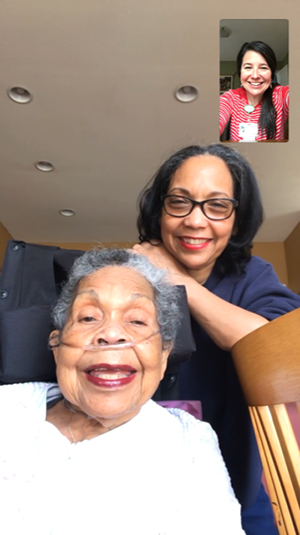
By Lacy Kidwell, MA, MT-BC
A few weeks ago, during a pre-screening phone call (that is now required for all home care visits), I spoke with a patient’s daughter who is a respiratory therapist at GBMC. We decided, for the safety of all, that instead of visiting in person, we would try a “virtual” music therapy visit. Working with hospice patient Margarita Erazo and her daughter, Myra Erazo-Marmolejo, through FaceTime was the first time in my 15-year career that I conducted a music therapy session using a video-chat platform.
I was hesitant, but as soon as we “connected” and I saw Margarita’s face light up with a huge smile, my apprehension melted away and the music began as it always does. For the next hour, despite being 30 miles away, I could hear Margarita singing and humming to her favorite tunes. Myra sat close by, choosing songs, singing and encouraging Margarita to sing. When there were pauses in the music, Margarita would say “lindisimo” (very pretty) or “lo siento en mi corazon” (I feel them deep in my heart).
Because Margarita is no longer able to attend church services, we spend a lot of time singing familiar hymns in Spanish. When I observe her not singing, Margarita will explain that she is just listening, as her “heart fills with joy and love.” For Myra, she says, “It’s very nice to see how happy my mom gets, to see her smile.”
Honoring Our Veterans
By Jillian Tolman, MA, MT-BC
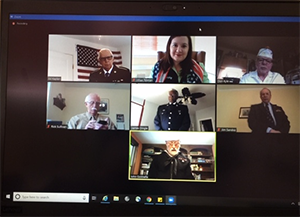
Recently, I provided music for a virtual Salute to Service for an Army veteran. It was amazing! We laughed because technology is always funny… and we cried as we honored this veteran and his family. As the Salute to Service was conducted, we spoke with the veteran about his service and met family from around the world (including a son serving in Germany!). It was very different, but our purpose was the same: Honor Our Veteran.
Although we could not all be together in person, it was amazing that family and friends from far away were “there.” I have been honored to be a part of the We Honor Veterans program and was worried about how COVID-19 would affect these ceremonies. I’m happy to say that we stand beside our veterans and their families, still conducting ceremonies, and the music therapists are still playing a meaningful role in honoring our service men and women.
Feeling Joy for the First Time in a Long Time
By Jillian Tolman, MA, MT-BC
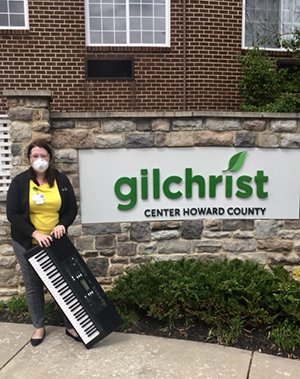
COVID-19 has provided us with a unique opportunity to address symptoms of isolation and loneliness using music. Many of us know that emotional distress negatively affects our physical and mental health. I have found that this pandemic is increasing the cases of isolation and depression. Music therapy can help ease these feelings.
Twice a week, I visit Gilchrist Center Howard County to provide music therapy to patients. One patient had been experiencing an increase in pain. The first time I met her, she shared with me, “I miss my family so much. And I miss normal life. Even with this disease, I miss the things I used to have. It’s like I’m all alone.”
We talked about the connection between her pain and feelings of loneliness, and agreed that music therapy could be used to treat both symptoms. During our visits, she can focus on the music she hears and sing along to hymns that have special meaning. At the end of our second session, she shared, “I look forward to your visits. I really enjoy the time we spend together, and it helps me with my pain.”
So many of our patients are feeling this way. They miss people, they miss companionship, they miss being touched. Part of my job is to connect with patients and help them know that they are not alone.
Another patient, who grew up in Europe, expressed feeling “joy for the first time in a long time” brought on by the music we shared. She reminisced about her home, traveling, and her family. After singing “Climb Every Mountain,” she shared, “I can see the mountains as clearly as if I were there again with my sister.” The music that creates these images is helping our patients feel connected to their friends and family again.
Traveling Back to Another Time
By Emily Mahoney, MMT, MT-BC
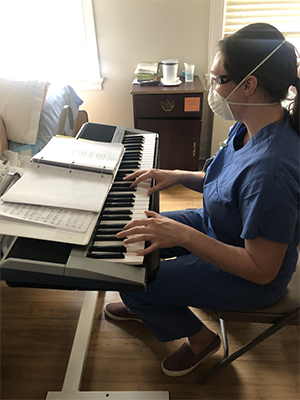
At Gilchrist Center Baltimore, many families who are used to visiting daily are no longer able to visit, and patients are now experiencing greater isolation. To reduce these symptoms and provide more support, we have increased music therapy at this center. This means that I can respond immediately to our anxious or agitated patients, collaborating with the nursing staff to avoid medicating if possible, or to make an uncomfortable procedure less anxiety-provoking.
Music therapy can also foster meaningful social interaction, encourage emotional expression, and improve quality of life. We often associate music with meaningful memories, so it’s not uncommon to hear someone say, as I heard last week, “This brings me right back to another time…back when I was a teenager, standing on the street corner harmonizing with my friends.” Even when someone is unable to articulate those memories, we believe that the feelings they associate with those memories are very much present with them when they hear the right music. The best part about my work is being able to share these moments with families, using video chat on an iPad to bring them into the room. Music therapy is often a time when patients are most alert and engaged, so it can be an ideal quality time to spend with loved ones. We are living in a time of uncertainty and fear, and being separated from those you love can only exacerbate those feelings. When I visit a patient, it is my hope that the music conveys this message: You are safe, you are loved, and we are here for you.
Educating and Training Future Music Therapists
By Lacy Kidwell and Kendra Keesee, Music Therapy Intern
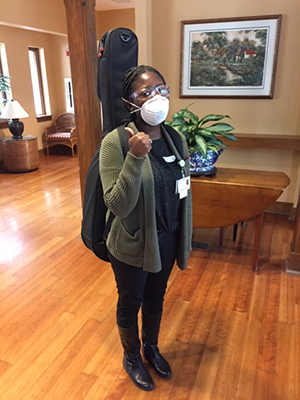
Kendra Keesee, a music therapy intern, recently completed her 9-month internship, having finished all the requirements needed to sit for the national board certification exam. The COVID-19 outbreak brought a lot of uncertainty for our internship program, as it did for many across the country. But Kendra, who relocated from Nashville, continued her training and education through seeing patients at Gilchrist Center Towson and helping to complete special projects that will benefit the Music Therapy program.
Questions?
To learn more about Gilchrist’s Music Therapy program, visit gilchristcares.org/music-therapy.
“Music…in time of care and sorrow, will keep a fountain of joy alive in you.” –D. Bonhoeffer


